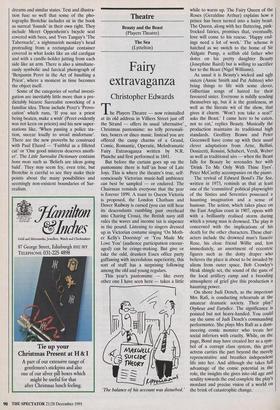Theatre
Beauty and the Beast (Players Theatre) The Sea (Lyttelton)
Fairy extravaganza
Christopher Edwards
he Players Theatre — now reinstalled
T
at its old address in Villiers Street just off the Strand — offers its usual 'alternative', Christmas pantomime: no telly personali- ties, boxers or disco music. Instead you are offered the camp charms of a Grand, Comic, Romantic, Operatic, Melodramatic Fairy Extravaganza written by N.R. Planche and first performed in 1841.
But before the curtain goes up on the pantomime there is half 'an hour of Late Joys. This is where the theatre's true, self- consciously Victorian music-hall ambience can best be sampled — or endured. The Chairman reminds everyone that the year is forever 1899. A toast to Queen Victoria is proposed, the London Chatham and Dover Railway is cursed (you can still hear its descendants rumbling past overhead into Charing Cross), the British navy still rules the waves and income tax is sixpence in the pound. Listening to singers dressed up in Victorian costume singing 'On Moth- er Kelly's Doorstep' or 'You Made Me Love You' (audience participation encour- aged) can be cringe-making. But give or take the odd, drunken Essex office party guffawing with incredulous superiority, this sort of stuff has a surprising following among the old and young regulars.
This year's pantomime — like every other one I have seen here — takes a little The balance of his account was disturbed.' while to warm up. The Fairy Queen of the Roses (Geraldine Arthur) explains how a prince has been turned into a hairy beast. The Queen, along with her fluttering, pink- frocked fairies, promises that, eventually, love will come to his rescue. 'Happy end- ings need a lot of work.' The scheme is hatched as we switch to the home of Sir Aldgate Pump, a selfish old father who dotes on his pretty daughter Beauty (Josephine Baird) but is willing to sacrifice her to the Beast (Nigel Williams).
As usual it is Beauty's wicked and ugly sisters (Annie Smith and Pat Ashton) who bring things to life with some clever, Gilbertian songs of hatred for their favoured sister. Everyone is mildly sending themselves up, but it is the gentleness, as well as the literate wit of the show, that gives it charm. 'Won't you take a seat?' asks the Beast.' I came here to be eaten, not to eat,' replies. Beauty. Musically the production maintains its traditional high standards. Geoffrey Brawn and Peter Greenwell have come up with their usual clever adaptations from Arne, Bellini, Donizetti, Rossini, Schubert, Verdi, Weber as well as traditional airs — when the Beast falls for Beauty he serenades her with `Drink To Me Only With Thine Eyes'. Peter McCarthy accompanies on the piano.
The revival of Edward Bond's The Sea, written in 1973, reminds us that at least one of the 'committed' political playwrights of the Sixties and Seventies possessed a haunting imagination and a sense of humour. The action, which takes place on the East Anglian coast in 1907, opens with with a brilliantly realised storm during which a young man is drowned. The play is concerned with the implications of his death for the other characters. These char- acters include the drowned man's fiancée Rose, his close friend Willie and, less immediately, an assortment of eccentric figures such as the dotty draper who believes the place is about to be invaded by aliens from outer space. Bob Crowley's bleak shingle set, the sound of the guns of the local artillery camp and a brooding atmosphere of grief give this production a haunting power.
On shore Judi Dench, as the imperious Mrs Rafi, is conducting rehearsals at the amateur dramatic society. Their play? Orpheus and Eurydice. The significance is pointed but not heavy-handed. You could say the same of Judi Dench's commanding performance. She plays Mrs Rafi as a dom- ineering comic monster who treats her social inferiors with cruelty. While, on the page, Bond may have created her as a sym- bol of a corrupt class system, this great actress carries the part beyond the merely representative and breathes independent life into her. And although she takes full advantage of the comic potential in the role, the insights she gives into old age and senility towards the end complete the play's mordant and precise vision of a world on the brink of catastrophic change.










































































































 Previous page
Previous page